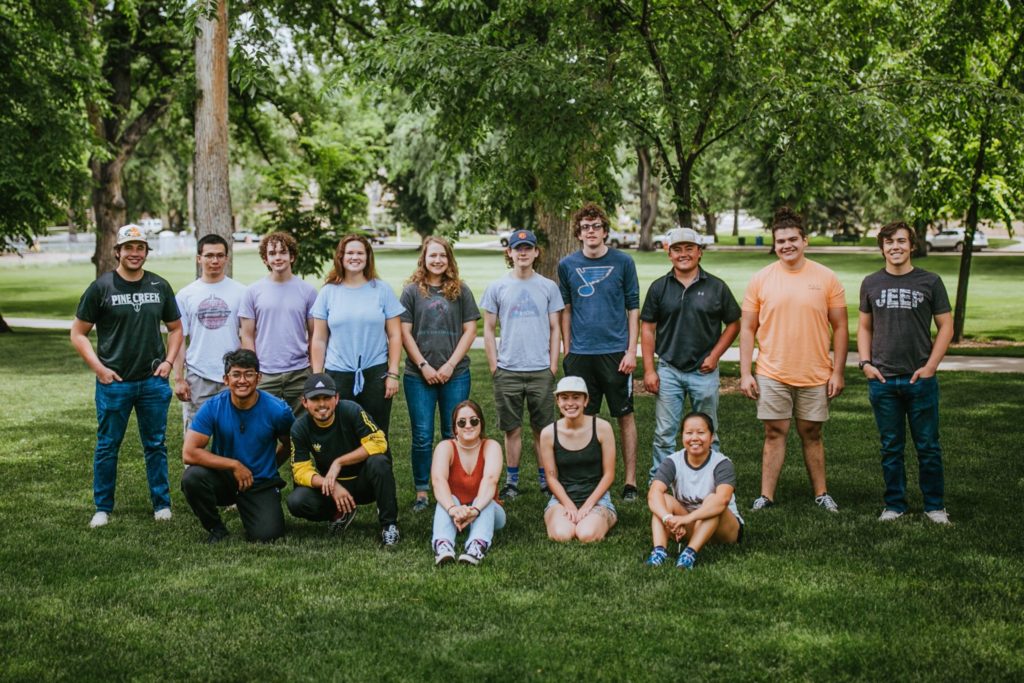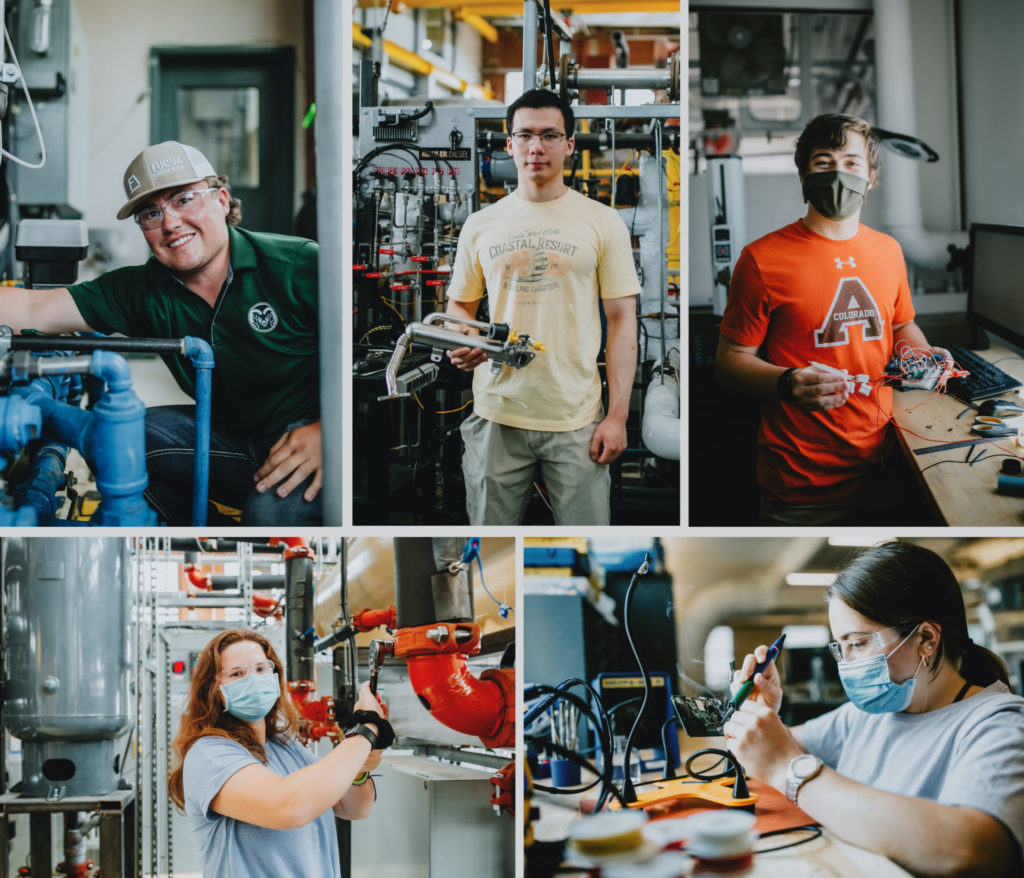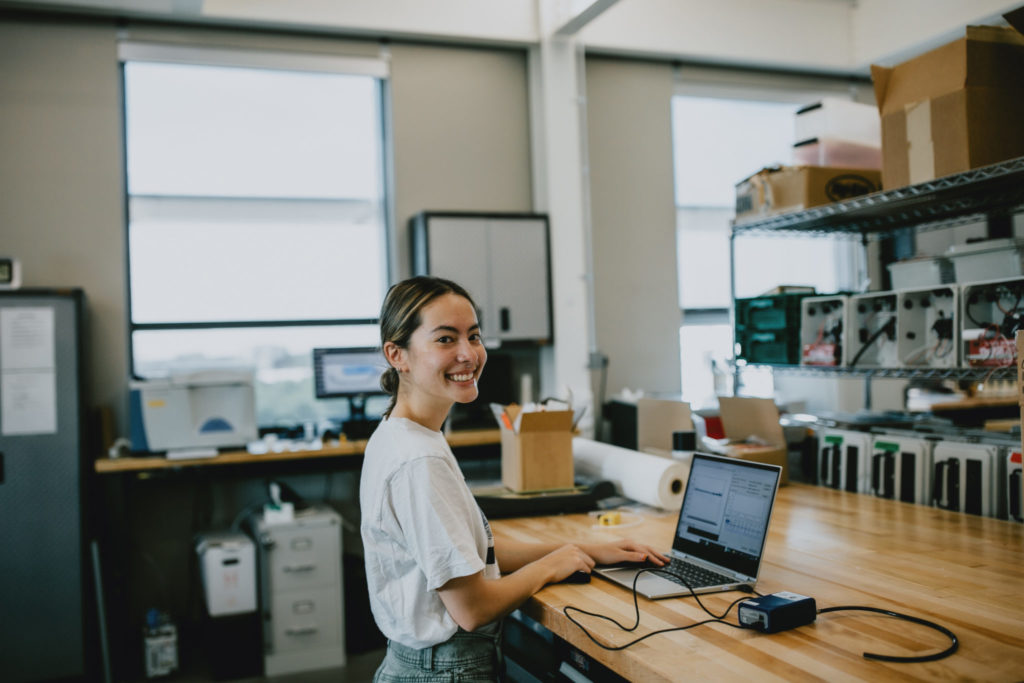
For 10 weeks this summer, 17 undergraduate students worked alongside nine Mechanical Engineering Principal Investigators on research problems that matter for society in sustainability, bioengineering, energy, and enabling materials technology. Their combined efforts contributed 6,800 working hours to research laboratories at CSU.
The pilot program – funded by the department, CSU’s Energy Institute, and the NSF Colorado-Wyoming Alliance for Minority Participation – included graduate school mentoring and an entrepreneurship workshop. The program attracted top undergraduate students from CSU and universities across the nation.
An introduction to research
Students were matched with a faculty advisor based on their research interests. Many joined teams with existing CSU graduate and undergraduate students, offering a chance to work with peers and make new friends.
Interns sought cutting edge research projects focused on making a positive impact on the world. Their projects included:
- Work on a DOE project to develop a new, sustainable fuel that has potential to reduce the carbon footprint of heavy duty vehicles and dramatically reduce their soot emissions,
- Study of the elevated levels of wildfire smoke being transported to the Front Range from California, Oregon, and Washington,
- Testing solutions to decarbonize industrial heat,
- Helping develop a low-cost sensor that lets individuals know if their mask or respirator is leaking – an effort to save lives during a pandemic, and
- Work on adaptive robots with applications including aiding in search and rescue in disaster areas.
These experiences showed interns how the research enterprise is conducted and provided faculty with quality assistants to grow research programs.
“Doing research gives me so much satisfaction, and the fact that this work could solve problems that will help the world in the long run is even more fulfilling,” said Victor Reyes-Flores, a summer intern from Puerto Rico. “I’ve learned much more than I would have ever imagined. I learned how to work with computer programs such as EES and SolidWorks, how to model heat exchangers and pipe flow, make a proper bill of materials, and so much more. This experience has helped me so much to grow personally and professionally. I cannot be more grateful.”

A path to graduate school
The summer research program is a great way for students to establish early pathways to graduate school. Interns participate in programming that includes Grad School 101, and gain understanding of the graduate school application process. They are also introduced to the CSU network and learn about opportunities that await them in paid research and teaching assistantships as a graduate student in the department.
“The resources the program provided for graduate school preparation have answered a lot of questions and uncertainties I had,” said Taylor Stoll from Oklahoma. “While I was considerably confident beforehand that I wanted to go to graduate school, this opportunity has made any doubts disappear.”
Victor agreed, expressing that the experience changed his perspective on graduate school completely. He’s now planning to pursue graduate school at CSU.
“The main purpose of graduate school is literally learning how to solve problems that no one has solved before,” said Todd Bandhauer, associate department head for graduate studies who is leading the program. “It’s learning and practicing the ability to express creativity and inventiveness in an effective way to solve real world problems. Much of the work our department does is applied – meaning it has an application in the real world that, if solved, will make a difference.”
A summer of experiences
Students participated in a variety of additional activities. In his Venture Validator entrepreneurship program, Scott Shrake of CSU’s nationally recognized College of Business coached interns on best practices of how to take engineering solutions to industry.
Interns also toured energy sustainability projects happening at CSU, from on-site solar installations to a geothermal heat pump, and engineering plans for CSU’s net zero emissions goal.
They got adventurous on a whitewater rafting trip down the Poudre River, getting another glimpse into why Fort Collins is such an amazing place to live.
And after 10 weeks of new experiences, the program ended with the IGNITE closing ceremony and celebration where students presented the culmination of their research work to other students, faculty, and staff.
Looking forward
The program is already showing signs of success by expanding research opportunities to high-caliber students from many different backgrounds. Of the group, 70% of interns were from non-CSU institutions, 41% were female, and 41% were from underrepresented populations.

“A graduate program that reflects the demographics, cultures, and values in our society – with Ayla being the perfect example – will be more successful and better suited to solving the most challenging problems of the 21st century,” said Shantanu Jathar, assistant professor and faculty advisor. “This program is a great way for our department to encourage top students from across the nation to attend graduate school.”
Donors interested in supporting the program in the future can visit the program giving page.